

Young and Well CRC - Safe and Well Online. Ajzen, I. (1991).
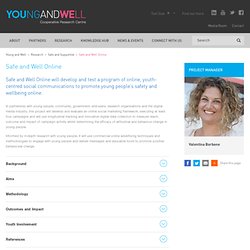
The theory of planned behavior. Organizational Behavior and Human Decision Processes, 50, 179-211. Andreasen, A. R. (1994). Social marketing: Its definition and domain. Andreasen, A.R. (1995). Andreasen, A. Australian Bureau of Statistics. (2011). Bronfenbrenner, U. (1979). Home. European Network for Mental Health Promotion. Best practice guidelines for mental health promotion programs: Children and youth. The Youth Mental Health IMPACT Survey: Building Web-based solutions for mental well-being - Home. Our History. THIS WAY UP Clinic was founded in 1998 as ‘CLIMATE’ (Clinicians’ Mate) by Professor Gavin Andrews.
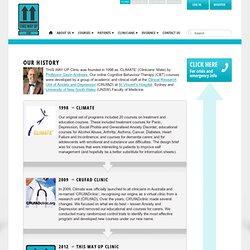
Our online Cognitive Behaviour Therapy (CBT) courses were developed by a group of academic and clinical staff at the Clinical Research Unit of Anxiety and Depression (CRUfAD) at St Vincent’s Hospital, Sydney and University of New South Wales (UNSW) Faculty of Medicine. Our original set of programs included 20 courses on treatment and education courses. These included treatment courses for Panic, Depression, Social Phobia and Generalised Anxiety Disorder; educational courses for Alcohol Abuse, Arthritis, Asthma, Cancer, Diabetes, Heart Failure and Incontinence; and courses for dementia carers and for adolescents with emotional and substance use difficulties. The design brief was for courses that were interesting to patients to improve self management (and hopefully be a better substitute for information sheets).
In 2012, we changed our name to THIS WAY UP Clinic . E-health - CMHR - ANU. CMHR undertakes a range of short and long-term research and development projects, focusing primarily on depression, anxiety disorders, substance abuse and bipolar disorder.
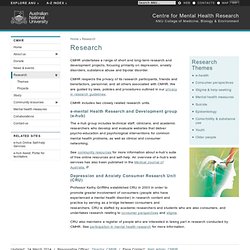
CMHR respects the privacy of its research participants, friends and benefactors, personnel, and all others associated with CMHR. We are guided by laws, policies and procedures outlined in our privacy in research guidelines. CMHR includes two closely related research units. Mood Tracker - Health Tools from MedHelp. THE LOWDOWN / Helping youth with depression. Think sensual not sexual. Sex is not just about penetration or orgasms it is a sensual experience that involves all your senses and your whole body.

Thinking sensual removes any performance anxiety and leaves you free to enjoy the experience whatever the outcome may be. Exposure to sensory stimuli, promotes the release of oxytocin (a peptide hormone), which is necessary for sexual arousal and pleasure in both women and men. So, engage all your senses by experimenting with:
Mental health - Reports, Studies and Projects. Wer wir sind. Screening Tools / SAMHSA-HRSA. Despite the high prevalence of mental health and substance use problems, too many Americans go without treatment — in part because their disorders go undiagnosed.
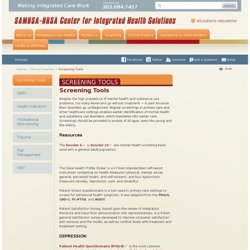
Regular screenings in primary care and other healthcare settings enables earlier identification of mental health and substance use disorders, which translates into earlier care. Screenings should be provided to people of all ages, even the young and the elderly. Resources The Healthy Living Questionnaire Please note that the first 8 questions are taken from the SF-8 Health Outcomes Questionnaire, and require a license to be administered. The Kessler 6 & Kessler 10 are mental health screening tools used with a general adult population.
Initiatives and Research - Consumer/Survivor. Here to Help, A BC Information Resource for Individuals and Families Managing Mental Health or Substance Use Problems. MyCompass - Login. Your pathway to a healthy mind. Headspace - Australia’s National Youth Mental Health Foundation. HereToHelp.bc.ca - Depression Screening and Education Day - Online screening. Students Against Depression. Self help webpages for students. Beacon: Find self-help for mental and physical health. Depressietest - Tools & therapie - Mentaal Vitaal. E-health.
Projects. Patient decision aids. Changes/additions to materials (reviewed 11/04/11): NICE updates anxiety guideline (View more / Close) Since these materials were published, NICE has published an updated clinical guideline for the management of generalised anxiety disorder (GAD) and panic disorder (with or without agoraphobia) in adults (clinical guideline 113, January 2011). The recommendations relating to GAD have been updated. Those relating to panic disorder are unchanged from the previous guideline. Please see MeReC Rapid Review No. 2682 for a brief summary of the guidance.
This patient decision aid focuses on anxiety. The patient decision aids have been developed to help guide difficult decisions in which patients need to consider benefits versus risks. These documents are based on the best available evidence but are not a substitute for a discussion with a suitably skilled healthcare professional. Patient decision aids. These patient decision aids (PDAs) have been developed to help support difficult decisions in which patients need to consider benefits versus risks.
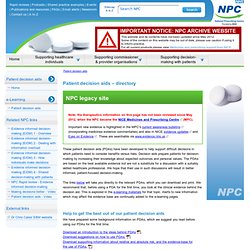
Decision aids prepare patients for decision-making by increasing their knowledge about expected outcomes and personal values. The PDAs are based on the best available evidence but are not a substitute for a discussion with a suitably skilled healthcare professional. We hope that their use in such discussions will result in better informed, patient-focused decision-making. The links below will take you directly to the relevant PDAs, which you can download and print. We recommend that, before using a PDA for the first time, you look at the clinical evidence behind the decision aid. Help to get the best out of our patient decision aids We have prepared some background information on PDAs, which we suggest you read before using our PDAs for the first time.
Download an introduction to the ideas behind PDAs. Depression Center: Symptoms, Causes, Medications, and Therapies. References Related to the Internet & Mental Health: Index. BluePages Depression Information - Treatments: Medical Treatments - Antidepressants. Antidepressants Our rating Adults Children and adolescents For fluoxetine For other antidepressants What are they?
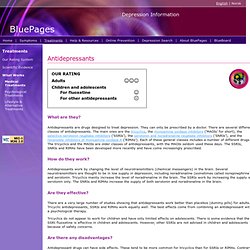
Antidepressants are drugs designed to treat depression. They can only be prescribed by a doctor. There are several different classes of antidepressants. How do they work? Antidepressants work by changing the level of neurotransmitters (chemical messengers) in the brain. Are they effective? There are a very large number of studies showing that antidepressants work better than placebos (dummy pills) for adults. Tricyclics do not appear to work for children and have only limited effects on adolescents. Getting help: when to seek help - When to seek help - Getting help. Firsthand experiences Melancholic depressionGraeme's story Psychotic depressionShirley's story Non-melancholic depressionLiz's story Everybody feels down or sad at times.

But it's important to be able to recognise when depression has become more than a temporary thing, and when to seek help. The following are a list of the features that may be experienced by someone with depression. Lowered self-esteem Change in sleep patterns Change in mood control Varying emotions throughout the day Change in appetite and weight Reduced ability to enjoy things Reduced ability to tolerate pain Reduced sex drive Suicidal thoughts Impaired concentration and memory Loss of motivation and drive Increase in fatigue Change in movement Being out of touch with reality.
It's also important to recognize that many of the above features could be caused by or related to other things, such as a physical illness, the effects of medications, or stress. Allow yourself to seek help. <p> </p>